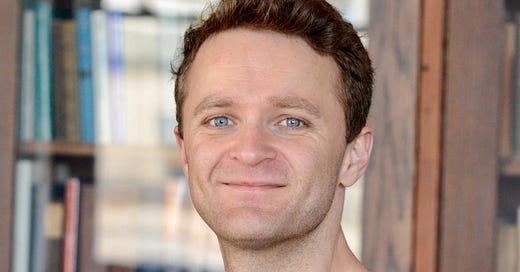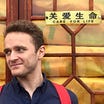Deported Australian writer: "I was desperately trying to maintain a sense of self"
Alistair Kitchen wrote accounts of the student protests at Columbia. He just found out that some of his readers were the U.S. Customs and Border Patrol.
Australian writer and journalist Alistair Kitchen was traveling from Melbourne to the U.S. to catch up with some friends. When Kitchen landed in LAX, he was pulled out of line and detained for hours—questioned about his views on the Israel-Palestine conflict, and asked to share information about the student protestors he wrote about at Columbia (where he got his MFA).
Kitchen detailed his experience being detained, interrogated, and turned back to Melbourne in this New Yorker essay—and I was interested to learn more.
Hard Reset spoke to him about having his phone sifted through by a power-hungry border agent, remaining psychologically sound in the face of interrogation tactics, and his awareness of the different profiles within authoritarian regimes.
Ariella Steinhorn: First of all, how are you doing?
Alistair Kitchen: I’m surviving on adrenaline and the goodwill of my friends. The amount of support I’ve received is hard to describe.
AS: Tell me a bit about your path, what led you to become a writer who covered the Columbia protests in the first place?
AK: Ironically—or maybe not ironically—it was George Orwell. His nonfiction is extraordinary because it’s devoted to a ferocious pursuit of the truth. I wanted to be like him.
I was studying at Columbia when the protest broke out. If you’re a writing student and an international protest picks up at your doorstep, it is incumbent on you to pick up a pen and paper and describe what is going on around you. I did it for myself and the few readers on my Substack at the time.
AS: Why were you studying at Columbia?
AK: I had been living in New York already for four years. I had ended a job and did not want to move back to Australia. I wanted to become a writer.
AS: Were you always interested in the Israel-Palestine conflict?
AK: I’m a politically engaged person. But I was not part of the protest movement. I was as an international student very fearful of my precarity. It was so visceral, I felt I had to start writing it down. I was participating as a journalist first and foremost.
AS: Could you have ever imagined when you embarked on that journalistic mission that you would be a future target for deportation?
AK: I’m hesitating … because on the one hand, what has happened was so extraordinarily strange and perverse. On the other hand, we non-Americans live in suspicion of the United States, and of Tech-enabled fascism. That suspicion we often write off as personal paranoia.
In the weeks leading up to my flight I’d tell friends “I hope they let me in.” It was a joke, but also born of a really real fear—a fear that turned out to be wholly justified.
AS: What was that like, being detained? Were you dissociating? How did you handle the waves of fear?
AK: The entire experience is meant to separate you from your capacities of reason. You are separated from other people, literally separated from your own country. You can only talk to these guards. The room is cold and bright, there are no windows. You are deliberately held with no information about when you might be released.
You feel fear—as a single person, subject to the utter power of a state which has immense discretion and power over you. You have little legal standing between two borders. If I were on the far side of the US border, I’d have much more legal standing.
You’re aware of all of this. I was desperately attempting to maintain a sense of self and stay psychologically operational. I had nothing but my mental faculties to go on.
AS: It must have been so frightening, being gaslit in that type of environment.
AK: When they make claims about you, it’s very deliberate on their part. They don't show you the evidence they claim to have against you. They use interviewing techniques of suggestion and entrapment to encourage someone in a psychologically frail state to self-incriminate.
AS: The agents saw very sensitive information on your phone, including pictures meant for your eyes or very specific people’s eyes only. Tell me about what it was like to have your phone invaded in this way?
AK: For anyone brought up in the digital era (I am 33), phones are libraries of our entire lives.
I’m a complex person who lives a sophisticated and rich life. I’m proud of that life. And I believe in a society where I’m not obliged to share that with the United States government. Despite libertarian traditions, it seems to think it does have the right.
Being forced to reveal my entire life to a nation-state made me feel extremely vulnerable and afraid.
AS: Do you think that they truly believe they are defending the U.S. from you?
AK: Certainly Officer Martinez is what I would call a “true believer.” He was canny and knowing in his deployment of those questions. I think that his job performance was marked on his ability to deny me entry.
I suspect that there are quotas that these guys have to meet, and they are eager to meet them. They understand themselves to be protecting the United States.
The second guard, Officer Woo, was a different type of man. He asked me, very innocently: “were the protests really not pro-Hamas protests?”
The innocence of that question stays with me. He had been told that, and he believed it sincerely. He was also willing to believe me when I told him it was not the case. I was so shocked that he even would suggest it.
Woo was a different type of officer from Martinez. He was a more innocent and less canny operator.
AS: Did you detect a change in Officer Woo when you disabused him of the notion that you were pro-Hamas?
AK: His facial expression changed radically. While Martinez had a negative affect, I think that Woo was a likable person caught in an evil machine.
When I told him that these absolutely were not pro-Hamas protests, I said it with such exasperation, that he almost seemed embarrassed. He laughed in embarrassment.
I think about Hannah Arendt’s Eichmann in Jerusalem. We see different shapes and psychological profiles attracted to different functions within authoritarianism. There are the unthinking functionaries—the banality of evil. And you have what you would call authoritarian personalities, people who are emotionally attracted to power—like Officer Martinez. What unites all the profiles is a kind of lack of emotional-intellectual capacity.
AS: Why do you think you were chosen out of the line?
AK: Thousands of journalists cross the border every day. In my mind, there are two explanations for why I was pulled out of line. One is that the CBP is operating with the support of systems provided by corporations like Palantir. The other is that, as we know from reporting in The Guardian, pro-Israeli groups, like Betar US, are giving lists of names to the Trump administration, of students who they would like to see deported. It could be both.
AS: Do you want to come back to the U.S.?
AK: It’s not up to me. I’d love to—there are many people who I love in the US.
But I’m now not able to get into the US on an ESTA visa, available to close allies of the U.S. like Australia and the United Kingdom. I’ll need a standard tourist visa.
I fear that I have been banned, and it’s unlikely that I go back during the Trump administration.
AS: What has the feedback been like since you went public?
AK: There are three groups of people I’ve been hearing from. The first group are Australians and foreigners, and they are horrified to see their fears about traveling to the United States confirmed. I’ve heard over and over, “oh I guess I’m never going back to the U.S., it’s not safe.” People are disavowing travelling to the U.S.
The second group are Americans who are horrified from a position of free speech. I just interviewed with Chris Hayes at MSNBC and Amy Goodman at Democracy Now. They used to understand themselves as members of an open society, and are horrified that they clearly are not.
The third group are people who are very glad to see me gone from U.S.—mostly internet commenters and trolls. They are either bots funded by conservatives and pro-Israeli groups, or people given permission by the state to be abusive on the internet. I try not to take their comments to heart.
AS: What made you so interested in knowing the truth?
AK: I’m still trying to understand that about myself. My parents have been wonderfully supportive. I can see in them a value that I hold more tightly in myself than any other: the pursuit of the truth even as it bears cost to oneself.
My parents are very private people, and they’ve never been political in the way I’ve been political. But they see intuitively why I’m doing it.
AS: What’s next?
AK: If you know, please tell me. This has been the most frenetic week of my life.
I want to continue the work I’ve been doing, just to keep telling the truth. I want to continue to write and publish.
Check out Alistair’s Substack here—and if you have any stories to share about crossing the border or being an international student in the United States right now, we’d love to hear.






